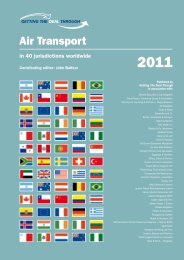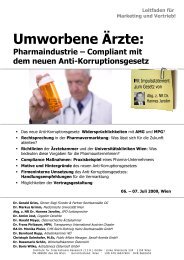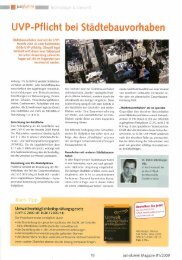The International Comparative Legal Guide to Aviation Law ... - Jarolim
The International Comparative Legal Guide to Aviation Law ... - Jarolim
The International Comparative Legal Guide to Aviation Law ... - Jarolim
Create successful ePaper yourself
Turn your PDF publications into a flip-book with our unique Google optimized e-Paper software.
<strong>Jarolim</strong> Flitsch Rechtsanwälte GmbH<br />
Austria<br />
(covering EASA part M, part 145, part 66 and part 147) on the<br />
continuing airworthiness of aircraft and aeronautical products, parts<br />
and appliances, and on the approval of organisations and personnel<br />
involved in these tasks (as last amended by EC Regulation No.<br />
127/2010).<br />
1.4 Is air safety regulated separately for commercial, cargo<br />
and private carriers?<br />
No, it is not.<br />
1.5 Are air charters regulated separately for commercial,<br />
cargo and private carriers?<br />
Special rules for charter flights <strong>to</strong>/from places outside of the EU are<br />
contained in the BGzLV.<br />
1.6 As regard <strong>to</strong> international air carriers operating in Austria,<br />
are there any particular limitations <strong>to</strong> be aware of, in<br />
particular when compared with ‘domestic’ or local<br />
opera<strong>to</strong>rs? By way of example only, restrictions and<br />
taxes which apply <strong>to</strong> international but not domestic<br />
carriers.<br />
In general, there is no legal differentiation between flight operations<br />
of international and domestic carriers. It may, however, be noted<br />
that international flights are exempt from Austrian VAT.<br />
<strong>to</strong> the BMVIT. Although organised as part of the BMVIT, the<br />
Federal Accident Investigation Agency may act independently and<br />
is not bound <strong>to</strong> any instructions of the BMVIT.<br />
<strong>The</strong> exclusive duty of the Federal Accident Investigation Agency is<br />
<strong>to</strong> determine the cause of the accident, in order <strong>to</strong> elaborate safety<br />
recommendations <strong>to</strong> avoid similar accidents in the future. It is not<br />
entitled <strong>to</strong> comment on liability issues, which are determined by<br />
Austrian civil courts. <strong>The</strong> investigation procedure is not public and<br />
must be initiated without delay. Premises where an accident has<br />
arisen may be accessed, any documents and evidence necessary <strong>to</strong><br />
complete the agency’s duty may be viewed, witnesses and other<br />
persons may be questioned and experts may be assigned. <strong>The</strong><br />
aircraft opera<strong>to</strong>r, manufacturer, crew, maintenance companies and<br />
relevant authorities must be granted the opportunity <strong>to</strong> submit a<br />
written statement before the agency’s investigation report is<br />
finalised. <strong>The</strong> final investigation report must be made public, if<br />
possible, not later than 12 months after the accident.<br />
Air accidents causing bodily injury or death <strong>to</strong> persons are regularly<br />
subject <strong>to</strong> criminal investigation proceedings of the Federal<br />
Prosecution Authority. In such cases, the simultaneous<br />
investigation of the Federal Accident Investigation Agency is<br />
subject <strong>to</strong> the consent of and collaboration with the Federal<br />
Prosecution Authority. Details of this cooperative approach are set<br />
out in two public decrees of the Austrian Ministry of Justice of 2<br />
August 2006 and 26 March 2008.<br />
2 Aircraft Trading, Finance and Leasing<br />
Austria<br />
1.7 Are airports state or privately owned?<br />
<strong>The</strong> Austrian airports are directly or indirectly (through state-owned<br />
companies) owned by the province or city the airport is located in,<br />
or both. <strong>The</strong>re are six airports in Austria: Vienna; Graz; Innsbruck;<br />
Klagenfurt; Linz; and Salzburg. Vienna Airport, as the largest<br />
Austrian airport, is the only one owned by a public limited company<br />
whose shares are listed on the s<strong>to</strong>ck exchange. According <strong>to</strong> the<br />
annual report for 2011, 50 per cent of its shares are in free float and<br />
20 per cent are owned by the city of Vienna and the province of<br />
Lower Austria, respectively. <strong>The</strong> remaining 10 per cent are owned<br />
by an employee foundation.<br />
1.8 Do the airports impose requirements on carriers flying <strong>to</strong><br />
and from the airports in Austria?<br />
In general, each airport has <strong>to</strong> publish its Conditions of Use<br />
(including the Tariff Regulations) which set out the specific<br />
requirements for the use of the airport.<br />
1.9 What legislative and/or regula<strong>to</strong>ry regime applies <strong>to</strong> air<br />
accidents? For example, are there any particular rules,<br />
regulations, systems and procedures in place which need<br />
<strong>to</strong> be adhered <strong>to</strong>?<br />
<strong>The</strong> system and procedure of investigation of aircraft accidents is<br />
set out in the UUG, which implemented EC Council Directive No.<br />
56/94, establishing the fundamental principles governing the<br />
investigation of civil aviation accidents and incidents and<br />
Regulation (EU) No. 996/2010 on the investigation and prevention<br />
of accidents and incidents in civil aviation and repealing Directive<br />
No. 94/56/EC.<br />
Aircraft accidents are investigated in an administrative procedure<br />
by the Federal Accident Investigation Agency, which is subordinate<br />
2.1 Does registration of ownership in the aircraft register<br />
constitute proof of ownership?<br />
Registration is only a formal requirement and is no proof of any<br />
ownership. <strong>The</strong> Austrian aircraft register is a so-called “opera<strong>to</strong>r<br />
register”, from which the public can only obtain information about<br />
the opera<strong>to</strong>r, but not about the aircraft owner.<br />
2.2 Is there a register of aircraft mortgages and charges?<br />
Broadly speaking, what are the rules around the operation<br />
of this register?<br />
<strong>The</strong> registration of mortgages and charges is not possible in Austria.<br />
Only the following information is registered and publicly available:<br />
Registration number.<br />
Nationality and registration mark.<br />
Manufacturer and manufacturer’s designation of aircraft.<br />
Aircraft serial number.<br />
MTOM.<br />
Name and address of the Opera<strong>to</strong>r.<br />
<strong>The</strong> legal owner of the aircraft is neither named in the certificate of<br />
registration nor publicly disclosed in the aircraft register.<br />
2.3 Are there any particular regula<strong>to</strong>ry requirements which a<br />
lessor or a financier need <strong>to</strong> be aware of as regards<br />
aircraft operation?<br />
No. <strong>The</strong> lessor/financier, who is typically the owner or pledgee of<br />
the aircraft is not publicly disclosed in Austria. Only the aircraft<br />
register itself is aware of the name of the owner of the aircraft.<br />
Since pledges cannot be registered, the fact that the aircraft is<br />
pledged in favour of a third party is irrelevant for the aircraft<br />
register.<br />
ICLG TO: AVIATION LAW 2013<br />
© Published and reproduced with kind permission by Global <strong>Legal</strong> Group Ltd, London<br />
WWW.ICLG.CO.UK<br />
19





